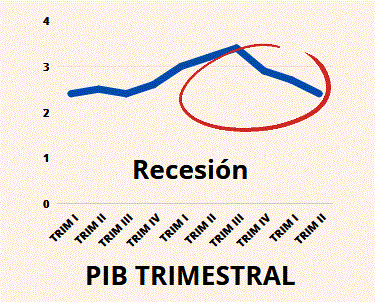
An economic recession is defined as a downturn in the economy that leads to a decline in GDP, due to a contraction in some or all of its components, consumption, investment and production of goods and services, for at least two consecutive quarters.
Keynes stated that if the confidence of companies and households decreases significantly, both will try to save more and invest less. This situation, when generalized, will lead to a decrease in spending and income.
Most economists have adopted the definition of recession published by Julius Shiskin, in a 1974 article in The New York Times, which stated that a recession exists after two consecutive quarters of negative GDP.
Recession is the second phase of economic cycles, the phases are:
- Expansion
- Recession
- Depression
- Recovery
In general, it is said that a recession becomes a depression when it lasts more than three years or when the fall in GDP exceeds 10%.
An economic recession can be defined as a phase of the economic cycle in which economic activity declines, investment, consumption and the production of goods and services are reduced, and unemployment increases.
Indicators of a recession
It is common for a recession to be preceded by a period of economic boom. Normally, before a recession there is an increase in prices, inflation, which affects consumers and businesses.
There are other variables that can be early indicators of a depression, such as production indicators, consumption, unemployment, car sales, confidence indicators, stock market indicators and interest rates.
Recession symptoms and consequences
During a recession, unemployment increases as there is no new hiring and in more severe cases there is also an increase in layoffs. As a consequence of the increase in unemployment and the rise in interest rates, families begin to face difficulties in paying mortgage loans.
In summary, the consequences of an economic recession are as follows:
- Financial markets: Fall of the stock market indexes.
- Labor market: Increase in unemployment, due to a decrease in hiring and an increase in layoffs.
- Decrease in consumption, investment and demand for goods and services (decline in GDP)
- Fall in sales, both wholesale and retail.
- Prices: Fall in inflation as a consequence of the decline in consumption.
- Decrease in production measured monthly by the PMI (Purchasing Managers' Index).
- Decline in corporate profits.
Causes of economic recession
In general, before an economy goes into recession, there are a series of variables or indicators that have a certain behavior.
After a period of overproduction, in which economic growth is accompanied by an increase in the prices (inflation) of housing and raw materials, it is common for many people to go into debt, which will cause the economy to slow down. When there is an oversupply, which demand is not able to absorb, there is an accumulation of stock, so companies will have to produce less and will have to lay off part of their workers, which will lead to a decrease in consumption.
In addition to oversupply, another possible cause of an economic recession is the uncertainty that occurs when it is not known how the economy will behave. This makes it difficult for companies and consumers to make decisions, which reduces, or at least delays, spending and/or investment, resulting in a decline in economic activity.
Another common cause of economic downturns is speculation. If investors buy assets in the hope that prices will rise and these rise in an exaggerated way, some of them will start to sell, so that supply increases above demand, contrary to expectations, prices will start to fall, as happened in some countries in 2008 in the real estate market.
How to deal with a recession
To combat recessions with falling prices that could lead to deflation, central banks use expansionary monetary policies, lowering interest rates, in order to encourage consumption and investment and thus reactivate the economy.
In the event that the recession is accompanied by an increase in inflation, central banks will try to combat it by raising interest rates to prevent stagflation from occurring.